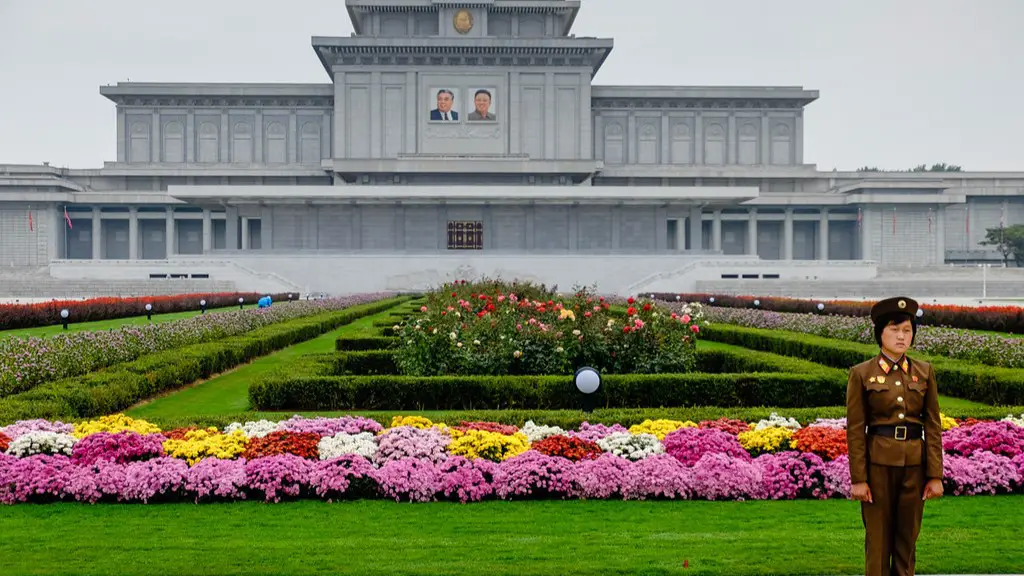Japan is a fragile but advanced nation with a long history of political turmoil and economic stability. In the past century, the country has overcome multiple global conflicts and events to emerge as one of the world’s leading economic powerhouses. Now however, Japan faces a formidable adversary in North Korea, and the question of how Japan can defend itself must be asked.
The political situation between North Korea and Japan is complex. North Korea has repeatedly threatened to exercise its nuclear weapons capability against Japan, and has launched numerous military exercises in the East Sea/Sea of Japan. As a result, the Japanese government has become increasingly alarmed by North Korea’s behavior, and has adopted a position of firmly but strategically pressuring Pyongyang in order to deter its provocations.
In order to effectively protect itself against North Korea, Japan has had to adopt a number of advanced measures. This includes strengthening defense commitments with its treaty ally, the United States; bolstering the capabilities of its Self-Defense Forces; and actively engaging in regional diplomacy with other countries in the region. Japan has also taken steps to reinforce its Ballistic Missile Defense system and has recently revealed plans to increase defense spending by 0.8%.
Most experts agree that although the diplomatic and military responses that Japan has adopted so far have been prudent, they will ultimately not be enough to guarantee the nation’s security. Consequently, Japan is actively exploring a range of other methods that could further bolster its defense capabilities. This includes strengthening its cyber defense network, incorporating a “robust offensive” element into its overall strategy, and exploring new forms of deterrence through the deployment of unconventional weapons such as unmanned drones and artificial intelligence systems.
Furthermore, while Japan has traditionally relied on the protection of the U.S. security umbrella, its recent moves to expand its defense policy and create its own defensive infrastructure suggests that the nation is now readying itself to meet the challenges of a security environment that is rapidly changing and becoming increasingly unpredictable. Despite these measures, the main challenge for Japan will be to effectively combine diplomacy and military power to protect itself from North Korean aggression in an increasingly chaotic world.
Exploring Economic Sanctions
One of the most effective ways that Japan can defend itself from North Korean aggression is by utilizing economic sanctions to discourage and reduce Pyongyang’s militarization efforts. Economic sanctions are an important tool for controlling the actions of another state and can be used to signal a strong opposition to an aggressor. By using economic sanctions to signal its disapproval, Japan would not only be able to degrade North Korea’s military capabilities, but also signal to the rest of the world that it will not tolerate Pyongyang’s belligerence.
Additionally, economic sanctions can also be used to improve the overall political landscape in the region by disrupting North Korea’s weapons supply and putting pressure on the country to drop its nuclear ambitions. By depriving North Korea of its foreign currency and cutting off its access to external trade, Japan would be able to force Pyongyang to rethink its strategy and possibly even agree to denuclearization talks. Indeed, this is a strategy that Japan has already employed in the past, with noteworthy results.
Finally, Japan has also been keen to improve its standing in the global security community and to increase its influence within the United Nations Security Council. To that end, Japan has explored the use of economic sanctions to signal the nation’s resolve and commitment to preserving peace and security in the region. As such, economic sanctions remain a valid and effective tool for Japan to exert its influence and protect itself from North Korean aggression.
U.S Defense Umbrella
Japan has traditionally relied on the United States’ security umbrella as a primary protective measure against North Korea’s aggression. This umbrella consists of the U.S.-Japan Security Treaty, which is the cornerstone of the U.S.-Japan alliance and allows the United States to defend Japan in the event of a North Korean attack. Additionally, the United States has also deployed thousands of troops and military equipment to Japan, and has repeatedly concluded joint military exercises and operations with the Japanese Self-Defense Forces in order to emphasize and fortify the U.S.-Japan alliance. As such, U.S. guarantees remain a critically important factor for ensuring Japanese security.
To further strengthen the U.S.-Japan alliance, the United States and Japan have recently agreed to revise the terms of the Security Treaty, increasing cooperation and coordination between the two countries. Additionally, the U.S. has also shifted its focus from the Middle East to the Asia-Pacific region and is now focusing on increasing its presence in East Asia. As such, U.S. power and influence will be increasingly important for curbing North Korea’s nuclear ambitions and protecting Japan from the threat of attack.
Furthermore, while the U.S. security umbrella is an essential factor in protecting Japan from North Korean aggression, its viability is increasingly uncertain. U.S. President Donald Trump has raised doubts about U.S. commitment to the security alliance, a trend which is deeply troubling for Japan, as any reduction in U.S. support could leave Japan more exposed to North Korea’s warlike behavior.}.
Strengthening Comprehensive Defense Capabilities
In addition to economic sanctions and the U.S. security umbrella, Japan is looking to further bolster its defense capabilities by strengthening its Comprehensive National Defense Strategy (CND). This strategy seeks to enable Japan to effectively combat a wide range of external threats, including those posed by North Korea. To this end, Japan has adopted a whole-of-government approach, including developing an early warning system, improving surveillance capabilities, increasing maritime and air defense capabilities, and strengthening its ballistic missile defense system.
To further improve its defense capabilities, Japan is also looking to make use of cutting-edge technology, such as advanced radar systems and attack drones, as well as new forms of unconventional warfare, such as hybrid warfare and cyber warfare. Similarly, Japan has also increased its participation in international exercises, such as “Rim of the Pacific”, in order to strengthen its understanding of regional issues and better prepare for future threats.
Finally, Japan is also looking to further enhance its defense capabilities by strengthening regional partnerships with other countries in East Asia, such as South Korea, China, and Russia. These partnerships seek to create an environment in which all countries in the region work together to share information, analysis and strategies for addressing regional security issues. By creating a collaborative security structure, Japan hopes to further solidify its defense capabilities and reduce the threat posed by North Korea.
Conflict Resolution
Given the tense and unpredictable security environment that has developed between Japan and North Korea, the question of how best to navigate the conflict and arrive at a peaceful resolution must be asked. To this end, Japan has taken a number of diplomatic measures, such as offering humanitarian aid to North Korea, engaging in dialogue with Pyongyang, and participating in multilateral efforts to denuclearize the Korean Peninsula.
Moreover, Japan has also looked to encourage regional dialogue and collaboration among countries in the region. For instance, Japan and South Korea have worked together to open a direct dialogue between North and South Korean representatives. Similarly, Japan has also encouraged China and Russia to engage in diplomacy and conflict resolution efforts with Pyongyang, and has shared intelligence with both countries in order to better monitor and understand the situation.
Finally, Japan has also joined with other nations to craft a series of United Nations Security Council resolutions that seek to curb North Korea’s nuclear ambitions. These measures have had a notable impact on North Korea’s ability to obtain and develop the materials needed to construct nuclear weapons, and have been widely praised by the international community.
Analysis andConclusion
Japan is a nation that is faced with an increasingly hostile neighbor in North Korea and it must now answer the question of how to protect itself from the rogue state’s aggression. Through economic sanctions, reliance on the U.S. security umbrella, and the strengthening of its own defense capabilities, Japan has employed a range of measures to protect itself from North Korea. At the same time, Japan has also explored diplomatic options and actively engaged in conflict resolution efforts with other countries in the region. As such, while the threat posed by North Korea is a grave one, Japan has demonstrated that it is actively working to protect itself and its people.




